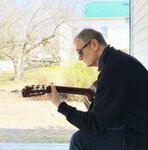Pedro Boregaard is a purveyor of beauty. His artisan jewelry business—originally located at Madison Avenue and 53rd Street in Manhattan, now on Main Street in Narrowsburg—celebrates its …
This item is available in full to subscribers.
Please log in to continue |


Pedro Boregaard is a purveyor of beauty. His artisan jewelry business—originally located at Madison Avenue and 53rd Street in Manhattan, now on Main Street in Narrowsburg—celebrates its 40th anniversary this year. He is also a sculptor, a gardener, an antiquarian, and more recently, a folk singer.
His first-ever solo performance takes place later this month—at the Delaware Valley Opera Co.'s Arts Nest—March 24th. At seventy-seven, odds are against him to achieve notoriety or success with his music, yet he feels compelled all the same.
The impetus, in fact, came seven years ago, following a partial loss of sight and a diagnosis of macular degeneration. His first composition, “I Don't Know What Made Me Do It,” came shortly after. It is an everyman's tale cast in Wild West narrative tropes. Then came two more. He performed them at various open-mic nights around Sullivan County to gain comfortability and gauge audience reaction. Now he has thirteen songs. Enough for a stand-alone gig. Possibly an album.
Boregaard is lithe, even a bit gangly, save for his debonnair sense of style. He wears dark glasses on-stage and projects an air of the classic troubadour. Like the Renaissance-era memoirist Benvenuto Cellini, he basks in the creative pedigree of his parents, both of them ballet dancers. Also of his apprenticeship as a young man with the prestigious Hemmerle jewelry house in Munich.
His first name is Spanish; his last name German. His mother had been displaced during WW2 and apparently met his father—an American expat in a dance company in Vienna—while on-the-run. She went on to France then England from there. He would not actually meet his father until he was twenty. The rest he prefers to keep private.
He tried his hand once at making folk music, in NYC, in the early/mid-'70s. It was the period of disco fever, however, and he got caught up in that instead. Frivolity and decadence ran alongside a serious desire to be recognized in his field. He worked as a master goldsmith for Tiffany's for nearly a decade before opening his own shop. Looking back, he recognizes a certain talent for subtlty, for sleekness, and for balance. “Things are correct,” he says, “when you discover the essence, which is innate.” These are aspects which he brings to his latent music venture as well.
His second-ever song is entitled “Imprint.” It begins impressionistically; a slice-of-life approach: “I am still here wide awake/Sitting and drinking.” Then it turns maudlin: “Memories fade”... “Earth kept on spinning.” Yet by the end comes wisdom, sentimental and etched in relief, like jewelry: “But one thing I am sure of/That forever will last/The imprint of your soul on my heart.”
He sings like he talks: monotone and with a thick German accent. It works for the songs; brings out their intimate qualities. He says he likes telling stories and entertaining people. That he does it for the customers who come into his shop. He still masterminds all the necklaces, rings, and other baubles himself, but has a long-time apprentice, Mario, execute the actual smithwork.
Back at his home in Narrowsburg, a stone's throw from his shop on Main Street, Boregaard gives me a preview of his upcoming gig. He plays a classical guitar which he says a friend gave him. It's a bit longer than the standard acoustic and perfectly suited to his angular body.
One of the songs is called “I Would Leave It the Same.” It, like the others, is reflective of experience: “Given the chance/To do it again/And asked what I wanted to change/Now looking back/It makes perfect sense/I would leave it the same.” Memory, for this composer, is as a rough-hewn stone. It waits for insight and imagination to be polished into poetry.
Comments
No comments on this item Please log in to comment by clicking here